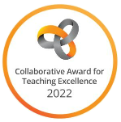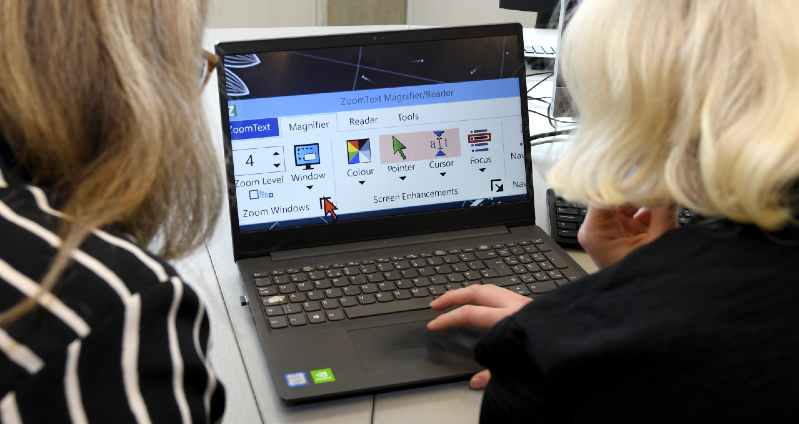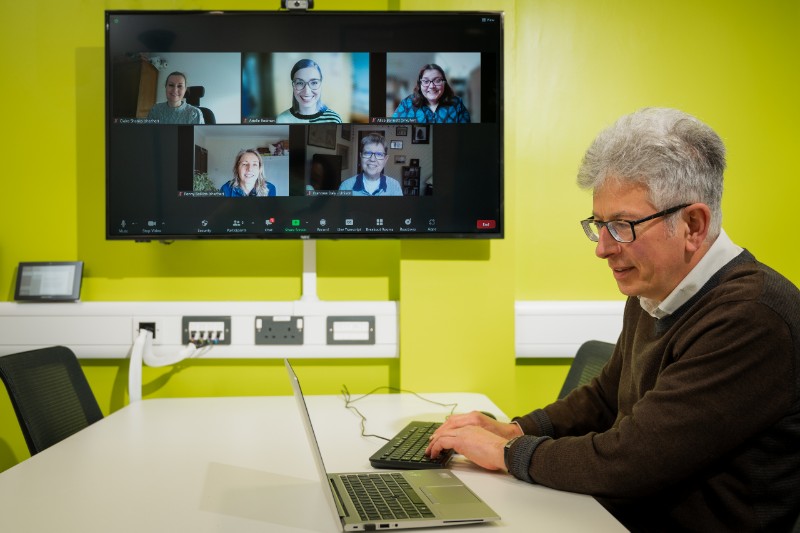E-accessibility working group

The e-accessibility working group oversees the provision of accessible digital systems and related training. We provide guidance on software and assistive technologies and accessibility statements for digital services, reporting on these activities to the Accessibility Coordination Group.
We operate as part of the University’s Disability Inclusion Framework and draw on representatives from professional support services, staff and student groups. The group is chaired by Dr Richard Walker (Programme Design and Learning Technology Team).
We are pleased to announce that the e-accessibility working group has won the Blackboard Catalyst Award 2021 for Inclusive Education and the 2022 AdvanceHE Collaborative Award for Teaching Excellence (CATE).


Find out more about Digital Accessibility
Key outputs
Key outputs
We aim to provide guidance and training across the University on meeting the 2018 regulations on digital accessibility. See the Training listed below and in the tab.
The Digital Accessibility Tutorial is available to staff through the HR LMS (Learning Management System). Everyone is encouraged to complete this once a year to ensure you stay updated on the current regulations and ways to improve digital accessibility for everyone.
We run several projects to embed digital accessibility good practice in departments through working with staff and with student interns. We conduct user research workshops and other user experience research to inform our activities.
Outputs like the Captioning Policy adopted by the University remind academics that it is a requirement to provide accurate closed captions on pre-recordings.
Accessibility statements
Accessibility statements
The 2018 regulations require us to have accessibility statements on our websites that tell people:
- how accessible the sites are,
- what areas are not yet accessible and
- what we are doing to fix them.
The statements also provide information on how to get in touch to request alternative formats of resources or to report a problem. The 2018 regulations are monitored by the Central Digital and Data Office and enforced by the Equality and Human Rights Commission (EHRC). Complainants can contact the Equality Advisory and Support Service (EASS) directly.
We should aim to link to the accessibility statements of any third-party suppliers and actively choose suppliers who meet the accessibility regulations.
- Central Digital and Data Office
- Equality and Human Rights Commission (EHRC)
- Equality Advisory and Support Service (EASS)
Our accessibility statements
Tools
Tools and practices for accessibility
One of the aims of the e-accessibility working group is to review, manage and recommend appropriate software requirements and licences to support e-accessibility across the University. Since the group started work in November 2018, we have acquired or installed the following:
- Siteimprove - Carries out automatic testing on the University website. (Note that user testing was also conducted.)
- Blackboard Ally - An accessibility checker for instructors using Blackboard. This also generates alternative formats for students and an accessibility report at an institution level.
- Mathtype - Mathtype licences allow instructors and students to type accessible maths in Microsoft Office.
- Texthelp Read&Write and EquatIO - Texthelp tools aid reading, writing and listening to text and maths online.
- Xerte - An open-source e-learning authoring tool that allows us to create accessible and interactive content more easily.
- Kortext - The University has provided core funding for this year’s pilot for first year undergraduate and PGT online textbooks.
- Grackle - An accessibility checker for Google Docs and Slides.
We have also created a website for creating accessible equations with the tools we have explored:
Training
Training on digital accessibility
The group coordinates and plans training for all staff to ensure key accessibility principles are adopted when using digital systems. Training events are advertised on the e-accessibility calendar and include both internal and external events.
Awareness
A good starting point for anyone is to complete the online digital accessibility tutorial. This short animated introduction to digital accessibility covers:
- the 2018 regulations,
- how to produce digital content that is universally accessible and
- how to make improvements that can help everyone.
Next, arrange a briefing for your team so that everyone is aware of how they can make improvements in relation to their areas of responsibility. You can also attend a generic accessibility briefing session. See the e-accessibility calendar for dates and to sign up.
Workshop
You should also attend the two-hour workshop, Creating Accessible Documents, or complete the self-access version of the workshop on Yorkshare (coming soon). You can make arrangements for your team to receive a bespoke version of the workshop.
Change your practice
Finally, talk to people in your team and those around you about digital accessibility:
- Do research into what helps those around you. You can read about how the PDLT and Library ran their user research workshop and follow their guide on how to run digital accessibility user research
- Make a plan to improve your digital skills further with the staff digital skills framework
- Promote greater attendance at the digital skills training sessions for staff and students.
Making the internet a fairer place requires all of us to get involved! See Leading accessible practice in your department, Inclusive teaching and learning and Empowering learners.
Links for this tab:
- Arrange a bespoke briefing or workshop [Google Form requires login]
- Guide on how to run user research [Google Doc]
- Creating Accessible Documents - support materials
- Leading accessible practice in your department
- Inclusive teaching and learning
- Empowering learners
- Staff digital skills framework
- Digital skills training sessions
Assistive technology
Assistive technology
The E-accessibility working group is undertaking an audit of the assistive technology and equipment available for disabled staff and students.
Part of this work includes promoting good practice with the tools we already have (Microsoft Office Accessibility checker, Grackle, Blackboard Ally, Texthelp Read&Write, Texthelp EquatIO etc.). Another aspect is to evaluate and champion for the most effective tools for the users who need them (see the Tools tab). Finally, we need to ensure our staff and learners know how to maximise the technology at their disposal to cater for their needs.
Links for this tab:
- Microsoft Office Accessibility Checker
- Grackle
- Blackboard Ally
- Texthelp
- Maximise the technology with our Introduction to Learning Technologies site and the Digital Skills Guides.

Champions
Department and Team Champions
A champion in your team or department can help to:
- Ensure all staff are aware of the accessibility regulations
- Promote the Digital Accessibility Tutorial and Creating Accessible Documents workshops
- Promote the regular monthly meetup where people can help each other to resolve sticky issues
- Promote assistive technologies for use by staff and students in the department eg Blackboard Ally, Texthelp etc
- Provide a sense of where people are at in becoming more accessibility savvy and organise any further training that the department may require
We hope that Departments will promote digital accessibility to their students too.
Contact Lilian Joy with your department or team champion. The list of champions will be added here soon.

Further links
Further links
Accessibility information from various teams at the University:
PDLT
- E-accessibility wiki pages
- York TEL handbook section 1.2
- Introduction to Learning Technologies for students
IT Services
Library
Marketing
Image by Damien Zaleski on Unsplash
Our blog posts
PDLT
- What is digital accessibility?
- Shifting digital accessibility practice
- What does 23 September 2019 mean to you?
- User research workshops
- E-accessibility, the mobile VLE and Collaborate webinars
- Accessibility for fully online programmes in Canvas: How user testing has driven recent improvements.
Marketing
Useful links
Regulations
University policies
Training
- Digital Accessibility tutorial (available via HR LMS)
- Creating Accessible Documents workshops
- E-accessibility calendar
- See the Training tab for more information
Research and resources
- Digital accessibility
- User research workshop
- Student experience research
- Marketing's accessibility wiki
- See the Further links tab for more information


